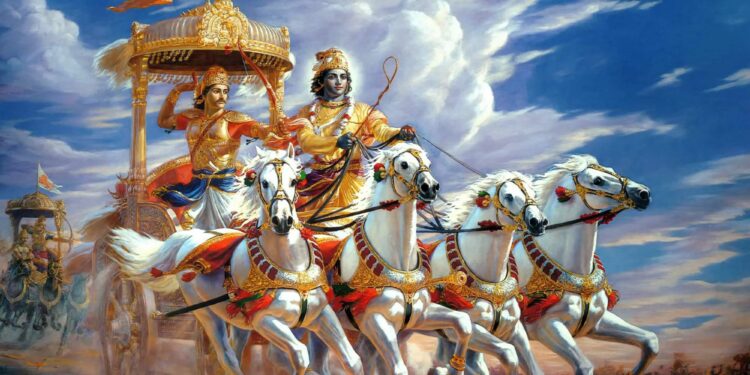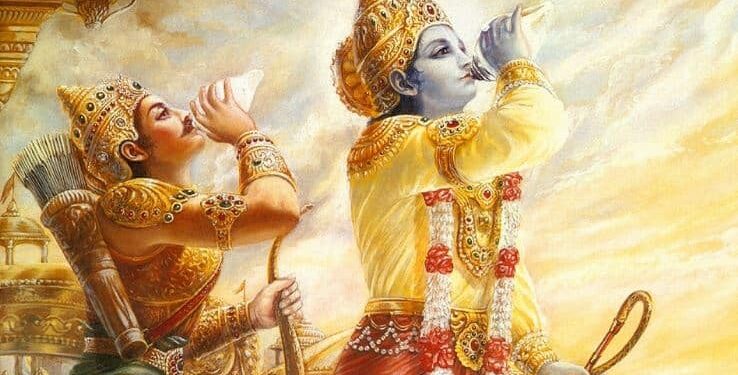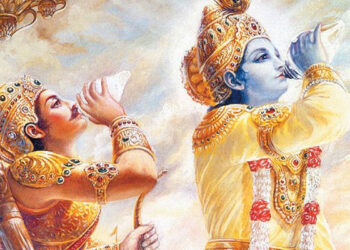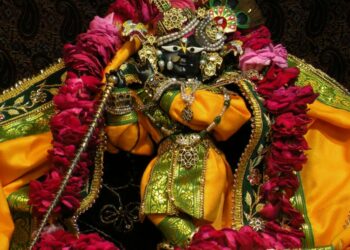TEXT 18
naiva tasya kṛtenārtho
nākṛteneha kaścana
na cāsya sarva-bhūteṣu
kaścid artha-vyapāśrayaḥ
SYNONYMS
na—never; eva—certainly; tasya—his; kṛtena—by discharge of duty; arthaḥ—purpose; na—nor; akṛtena—without discharge of duty; iha—in this world; kaścana—whatever; na—never; ca—and; asya—of him; sarva-bhūteṣu—among all living beings; kaścit—any; artha—purpose; vyapāśrayaḥ—taking shelter of.
TRANSLATION
A self-realized man has no purpose to fulfill in the discharge of his prescribed duties, nor has he any reason not to perform such work. Nor has he any need to depend on any other living being.
PURPORT
A self-realized man is no longer obliged to perform any prescribed duty, save and except activities in Kṛṣṇa consciousness. Kṛṣṇa consciousness is not inactivity either, as will be explained in the following verses. A Kṛṣṇa conscious man does not take shelter of any person—man or demigod. Whatever he does in Kṛṣṇa consciousness is sufficient in the discharge of his obligation.
TEXT 19
tasmād asaktaḥ satataṁ
kāryaṁ karma samācara
asakto hy ācaran karma
param āpnoti pūruṣaḥ
SYNONYMS
tasmāt—therefore; asaktaḥ—without attachment; satatam—constantly; kāryam—as duty; karma—work; samācara—perform; asaktaḥ—unattached; hi—certainly; ācaran—performing; karma—work; param—the Supreme; āpnoti—achieves; pūruṣaḥ—a man.
TRANSLATION
Therefore, without being attached to the fruits of activities, one should act as a matter of duty, for by working without attachment one attains the Supreme.
PURPORT
The Supreme is the Personality of Godhead for the devotees, and liberation for the impersonalist. A person, therefore, acting for Kṛṣṇa, or in Kṛṣṇa consciousness, under proper guidance and without attachment to the result of the work, is certainly making progress toward the supreme goal of life. Arjuna is told that he should fight in the Battle of Kurukṣetra for the interest of Kṛṣṇa because Kṛṣṇa wanted him to fight. To be a good man or a nonviolent man is a personal attachment, but to act on behalf of the Supreme is to act without attachment for the result. That is perfect action of the highest degree, recommended by the Supreme Personality of Godhead, Śrī Kṛṣṇa.
Vedic rituals, like prescribed sacrifices, are performed for purification of impious activities that were performed in the field of sense gratification. But action in Kṛṣṇa consciousness is transcendental to the reactions of good or evil work. A Kṛṣṇa conscious person has no attachment for the result but acts on behalf of Kṛṣṇa alone. He engages in all kinds of activities, but is completely nonattached.
TEXT 20
karmaṇaiva hi saṁsiddhim
āsthitā janakādayaḥ
loka-saṅgraham evāpi
sampaśyan kartum arhasi
SYNONYMS
karmaṇā—by work; eva—even; hi—certainly; saṁsiddhim—in perfection; āsthitāḥ—situated; janaka-ādayaḥ—Janaka and other kings; loka—saṅgraham—the people in general; eva api—also; sampaśyan—considering; kartum—to act; arhasi—you deserve.
TRANSLATION
Kings such as Janaka attained perfection solely by performance of prescribed duties. Therefore, just for the sake of educating the people in general, you should perform your work.
PURPORT
Kings like Janaka were all self-realized souls; consequently they had no obligation to perform the prescribed duties in the Vedas. Nonetheless they performed all prescribed activities just to set examples for the people in general. Janaka was the father of Sītā and father-in-law of Lord Śrī Rāma. Being a great devotee of the Lord, he was transcendentally situated, but because he was the king of Mithilā (a subdivision of Bihar province in India), he had to teach his subjects how to perform prescribed duties. Lord Kṛṣṇa and Arjuna, the Lord’s eternal friend, had no need to fight in the Battle of Kurukṣetra, but they fought to teach people in general that violence is also necessary in a situation where good arguments fail. Before the Battle of Kurukṣetra, every effort was made to avoid the war, even by the Supreme Personality of Godhead, but the other party was determined to fight. So for such a right cause, there is a necessity for fighting. Although one who is situated in Kṛṣṇa consciousness may not have any interest in the world, he still works to teach the public how to live and how to act. Experienced persons in Kṛṣṇa consciousness can act in such a way that others will follow, and this is explained in the following verse.


















